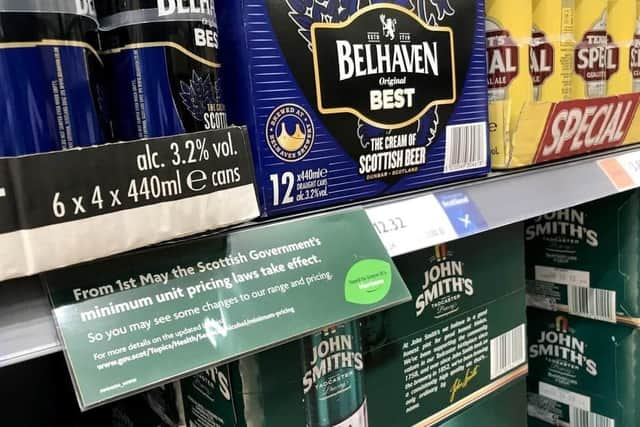Minimum unit pricing: Scottish Government confirms alcohol price rise to combat drink-related deaths
The base rate of minimum unit pricing (MUP) for alcohol will rise from September, it has been confirmed, as Deputy First Minister Shona Robison claimed the decision struck a “reasonable balance”.
The decision means the minimum price per unit of alcohol that can sold in Scotland will increase from 50p to 65p. It means the lowest price for a bottle of wine will rise from £4.88 to £6.34.
Advertisement
Hide AdAdvertisement
Hide AdThe change, which has to be approved by the Scottish Parliament, will not take place until September 30, Ms Robison confirmed.


The Scottish Government said a price increase is required to counteract the effects of inflation.
The rise, which had been previously mooted, was described as “flawed” by critics, with Scottish Conservatives’ shadow health secretary, Dr Sandesh Gulhane, saying research claiming MUP had reduced deaths was not accurate.
But Ms Robison said: “Research commended by internationally-renowned public health experts estimated that our world-leading MUP policy has saved hundreds of lives, likely averted hundreds of alcohol-attributable hospital admissions and contributed to reducing health inequalities.
“Despite this progress, deaths caused specifically by alcohol rose last year – and my sympathy goes out to all those who have lost a loved one.
“We believe the proposals, which are supported by Scotland’s chief medical officer, strike a reasonable balance between public health benefits and any effects on the alcoholic drinks market and impact on consumers. Evidence suggests there has not been a significant impact on business and industry as a whole.”
Last year, a meta analysis of more than 40 independent studies, published by Public Health Scotland (PHS), concluded MUP was “effective”.
According to PHS, the meta-analysis shows MUP “has reduced deaths directly caused by alcohol consumption by an estimated 13.4 per cent and hospital admissions by 4.1 per cent, with the largest reductions seen in men and those living in the 40 per cent most deprived areas”.
Advertisement
Hide AdAdvertisement
Hide AdThe report’s authors say this equates to 150 fewer deaths and 400 fewer admissions in 2022/23, using England – which has not implemented a MUP policy – as a control. Despite this, deaths have increased since 2018, when the policy was first implemented.
Responding to the MUP rate rise, Dr Gulhane said: “Let's start with alcohol related deaths. They're at a 14-year high in Scotland and even a novice statistician would tell you the hospitalisation data was not statistically significant.
“There are 40 studies in the evaluation of MUP and only one claimed a reduction in deaths. Saying MUP has reduced deaths is not accurate, as it was an estimate based on statistical modelling and if compared to Northern Ireland and not England would have shown MUP caused deaths.”
Dr Gulhane said that the number of people seeking help for alcohol reduced by 40 per cent, along with referrals to alcohol treatment.
The latest figures, published by National Records of Scotland, show there were 1,276 alcohol-specific deaths registered in Scotland in 2022 – an increase of 2 per cent on 2021. Female deaths rose by 31 to 440, with male deaths unchanged at 836.
Dr Iain Kennedy, of BMA Scotland, said his organisation was “a long-standing supporter” of MUP and he “strongly welcomes” the announcement.
"We have already seen that the policy can make a real difference, save lives and reduce hospital admissions,” he said. "These are positives that must be built on – but that can only be done if the policy develops as circumstances develop, and ensuring the price per unit is at the right level is central to that. In this respect, today’s decision is the right one.”
However, David Hume, a GMB Scotland organiser in the drinks industry, said the case for continuing with MUP “gets weaker with every piece of research published”.
Advertisement
Hide AdAdvertisement
Hide Ad“Ministers must be guided by reliable research and data, not wishful thinking and good intentions,” he said. “The potential consequences of this policy are too damaging for it to be justified with anecdote, hunches and hope.
“Five years ago, we were told this policy would help save lives of problem drinkers. Now we are told it is about curbing the intake of moderate drinkers, but there is no substantive evidence to suggest it does either.”
The union polled workers across the brewing, whisky and spirits last year, and found 64 per cent believe MUP should be scrapped “because it needlessly risked jobs and investment while doing nothing to discourage problem drinking”. A third said the rate should remain at 50p or be reduced.
Emma McClarkin, chief executive of the Scottish Beer and Pub Association, said the rise was “disappointing, especially during a cost-of-living crisis”.
But Colin Wilkinson, managing director of the Scottish Licensed Trade Association, said Scotland “has long had a challenging relationship with alcohol” and the link between low prices and increased consumption was “clear”.
"The sale of cheap alcohol has been a major factor in many people developing alcohol-related problems, so a proportionate increase in MUP makes absolute sense,” he said.
Liam Mehigan, operations director of the Abbeycare Group, which runs a specialist residential rehab and detox service in Erskine, said the centre welcomed “any initiative that could help reduce the harms caused by alcohol” in Scotland, “which our staff see first-hand every day”.
“However, the sale price is only part of the solution,” he said. “We also need to focus on preventing people from drinking harmfully in the first place.
Advertisement
Hide AdAdvertisement
Hide Ad“We would like to see more investment in harm reduction and treatment services for alcohol, including a review of marketing and education on the harms associated with it, as well as more thorough and consistent interventions in hospital A&Es, police stations, courts, and our prisons.”
Comments
Want to join the conversation? Please or to comment on this article.